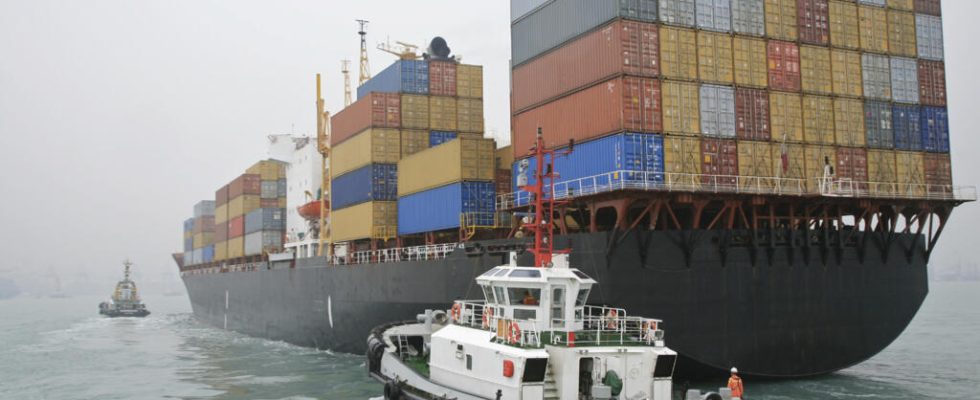An agreement to reduce greenhouse gas emissions from maritime freight, a very polluting sector, has been concluded by the member countries of the International Maritime Organization (IMO), but it is considered disappointing by environmental NGOs.
” The 80th Marine Environment Protection Commission (MEPC) of the International Maritime Organization (IMO) adopts a greenhouse gas reduction strategy tweeted the IMO, a body that depends on the UN, on Friday. She adds that the agreement displays the ambition to reduce CO2 emissions ” an average of at least 40% by 2030 compared to 2008 “.
This text, obtained by AFP on July 7, provides objectives “ callsigns » (therefore non-binding) reduction of polluting emissions by at least 20% by 2030, but with a target of less than 30%, and of at least 70% by 2040, with a target of less than 80% , compared to 2008.
Several NGOs already believe that the compromise is disappointing compared to the objectives that were targeted by many countries before the meeting, and insufficient to put the sector on the trajectory of a reduction in CO2 emissions within the framework of the Paris agreement of 2015.
In 2018, the IMO gave carriers a target of reducing their CO2 emissions by 50% by 2050 compared to 2008. But the European Union was calling during negotiations this week for a more ambitious target of net zero emissions by 2050 with two stages: reduction of 29% in 2030 and 83% in 2040.
Also to listenWhy the energy transition of maritime freight is slipping
A sector responsible for nearly 3% of CO2 emissions
The Pacific Island States, particularly threatened by global warming, wanted even more ambitious objectives, and were supported by the United States and Canada: -96% by 2040. Environmental NGOs for their part demanded -50 % by 2030 and carbon neutrality by 2040.
Conversely, many major exporters such as China, Brazil, Argentina, among others, have held back, saying that overly strict targets would benefit rich countries at the expense of developing countries. They opposed in particular the carbon tax projectbacked by French President Emmanuel Macron and companies like shipping giant Maersk.
Also to listenLess carbon and more wind for shipping
A possible tax now only appears in the draft agreement in a range of proposed measures to reduce freight emissions. The vast majority of the 100,000 ships in the sector, which transport 90% of the world’s goods, are powered by heavy fuel oil. The sector is responsible for nearly 3% of global CO2 emissions, according to the UN.
” The agreement’s level of ambition is far below what is needed to keep global warming below 1.5 degrees, and the wording of the text is vague and non-binding “, deplores the NGO Clean Shipping Coalition.
Read alsoA guaranteed particle-free ferry launched in Marseille, a first
(with AFP)
